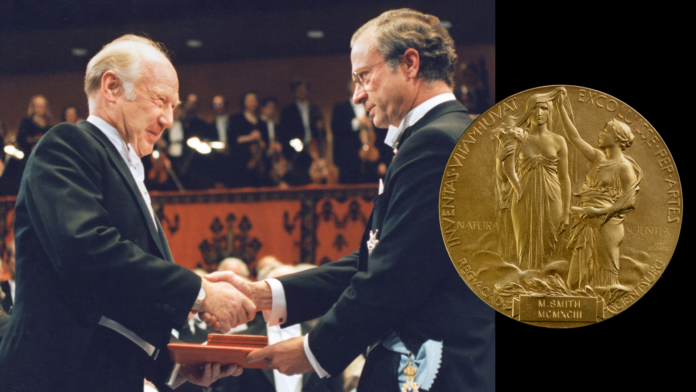On Oct. 13, 1993, Michael Smith slept through a very important phone call. Having spent the previous evening celebrating his daughter’s birthday, he’d taken out his hearing aids and forgotten to set his alarm. When he did wake up and turned on the radio to hear the Blue Jays score, he discovered he had become British Columbia’s first Nobel Laureate.
Smith was a biochemist. Born in the UK, he completed his PhD at the University of Manchester before completing his post-doctoral studies in Gobind Khorana’s Laboratory at the University of British Columbia.
His Nobel Prize-winning work came about almost by accident while studying a protein in yeast. Smith wanted to make a particular mutation, but at the time this was a random process. You applied a mutagen to a sample and waited to see what happened. If you were lucky, you got the change you wanted; if not, you tried again.
Not content with this, Smith and colleague Clyde Hutchison developed site-directed mutagenesis, a revolutionary technique that allows scientists to make a genetic mutation precisely at any spot in a DNA molecule, helping us understand more about how genes work, and what happens when they go wrong.
Despite the study being at first rejected for publication by Cell, this work would later win Smith the Nobel Prize in Chemistry alongside Kary Mullis, inventor of the polymerase chain reaction.
Site-directed mutagenesis and Smith’s subsequent work on DNA sequencing allowed an explosion of activity in genomics and genomics research, new tests and treatments for diseases such as cancer, and better understanding of conditions such as Alzheimer’s, cystic fibrosis and HIV/AIDS.
But Smith’s legacy stretches far beyond his research.
A man of humble origins, Smith donated his entire Nobel Prize award. Half of the $500,000 prize went to schizophrenia research, at the time a notoriously under-funded area. The other half he gave to Science World British Columbia and to the Society for Canadian Women in Science and Technology in an effort to both support women in research and engage the public in science – issues he was passionate and vocal about.
Seeing his new celebrity as a platform, Smith used it to advance scientific research in British Columbia and Canada-wide, and build the infrastructure that has put British Columbia on the map as a place for world-class research. Among the organizations he created and inspired are Genome British Columbia, the Michael Smith Foundation for Health Research, the Michael Smith Laboratories at UBC, and the Michael Smith Genome Sciences Centre at BC Cancer.
Twenty-five years after the Nobel Prize, Smith’s powerful legacy of research excellence and innovation lives on in Canada’s research community, through the researchers he mentored, the institutions that bear his name, and an enduring vision of British Columbia and Canada, as an international leader in life sciences research, making significant discoveries and bringing the benefits to Canadians.








































